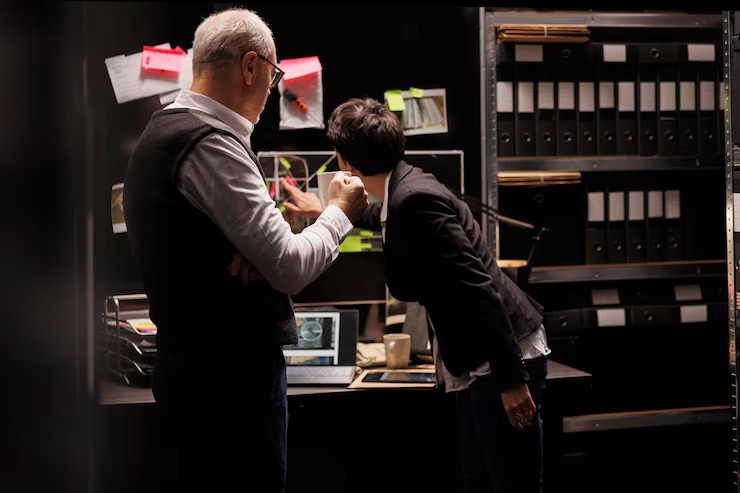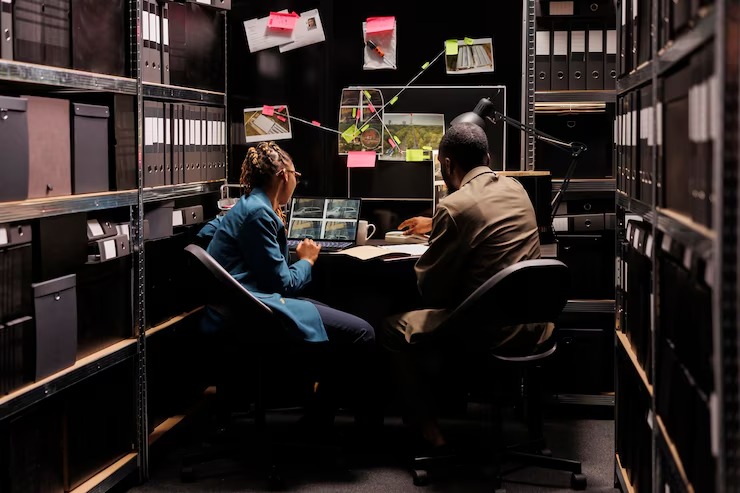Many people, particularly those in need of investigative services, often confuse private investigators with detectives, assuming they perform the same duties and carry the same authority.
This confusion is common among individuals dealing with personal matters such as infidelity investigations, missing persons, or legal disputes, as well as businesses seeking to uncover fraud or conduct background checks.
Understanding the distinct differences between these two professions is crucial for anyone considering hiring a private investigator or needing the services of a detective.
At Privin, we often encounter clients with these questions, highlighting the need for clear information
So, to answer the main question.
Private Investigator vs Detective: Do Private Investigators Have Badges?
No, private investigators do not carry law enforcement badges.
Most of the time, private investigators use identification badges for professional purposes, however, these are not the same as law enforcement badges and do not grant any legal authority.
Private investigators typically identify themselves using licenses issued by the state or region in which they operate. They might also carry business cards, company identification, and other credentials that confirm their professional status without implying law enforcement authority.
The use of any badge or identification is often governed by state or local regulations to prevent any misrepresentation.

Licensing Information for Private Investigators
Private investigators are required to be licensed in most states in the United States.
Here is an overview of the licensing requirements in some major states:
- Private Investigator License in California
To practice as a Private investigator in the State of California, they need to have a minimum of three years of experience in a related field, pass a written exam, complete a background check, and be licensed by the California Bureau of Security and Investigative Services (BSIS). The BSIS also sets the standards for continuing education and training for private investigators in California. (Source: BSIS Private Investigator Fact Sheet)
- Private Investigator License in New York
In New York, Private investigators must be licensed by the New York State Division of Licensing Services, complete a minimum of eight hours of continuing education every two years, pass a background check, and a written exam. New York also requires private investigators to carry liability insurance and to be bonded. (Source: New York State Division of Licensing Services)
- Private Investigator License in Texas
Private investigators must register with the Texas Department of Public Safety, complete a background check, and carry liability insurance. Texas does not require private investigators to be licensed, but registration is mandatory. (Source: Department of Public Safety Private Security Licensing)
- Private Investigator License in Florida
Private investigators, including private investigators in Miami, must obtain a “Class C” private investigator license through the Department of Agriculture. They are required to show documentation and verification of two years of full-time experience and pass an exam covering relevant Florida laws. (Source: Florida Department of Agriculture and Consumer Services)
Overall, the licensing requirements for private investigators are established by varying licensing entities from state to state.
In addition to licensing requirements, private investigators must comply with various laws and regulations that govern their conduct, such as respecting the privacy of individuals and adhering to the Electronic Communications Privacy Act (ECPA), which regulates the interception of electronic communications.
Learn more about Legal Boundaries of Private Investigators.

Private Investigators Vs Police Detectives: What is the Difference?
What is a Private Investigator?
A private investigator (PI) is a professional hired to gather information and conduct investigations for private clients. They work on a variety of cases, including surveillance, background checks, finding missing persons, and investigating fraudulent activities.
Unlike detectives, private investigators are not part of law enforcement and typically work for private investigation firms or operate as independent contractors.
What is a Detective?
A detective is a law enforcement officer who is responsible for investigating crimes. Detectives are usually part of a police department or other law enforcement agency and work on criminal cases such as homicides, theft, fraud, and other offenses.
They have the authority to arrest individuals, carry firearms, and use police resources in their investigations. Additionally, detectives are issued official badges by their law enforcement agencies.
What Makes a Private Investigator different from a Detective?
| Aspect | Private Investigator | Detective |
| Authority | No arrest powers | Can arrest suspects |
| Jurisdiction | Limited to legal boundaries, no police jurisdiction | Full jurisdiction within their law enforcement agency |
| Licensing | Varies by state, typically requires licensing | Certified law enforcement officer |
| Training | State-specific requirements, includes background checks | Police academy training followed by field experience |
| Firearm Carry | Only with specific permits | Standard issue as part of law enforcement |
| Access to Databases | Limited to public and commercial databases | Full access to police databases and forensic labs |
| Legal Boundaries | Must adhere to privacy laws (e.g., ECPA) | Operates under law enforcement regulations |
| Use of Surveillance | Can use, within legal constraints | Full access, often with fewer legal restrictions |
| Collaboration with Police | Can collaborate, but unofficially | Official capacity within legal cases |
| Identification | Business cards, licenses, but no law enforcement badge | Issued official law enforcement badge |
Authority and Jurisdiction
Private investigators operate within the constraints of the law but do not have the same jurisdiction or authority as law enforcement officers. They cannot make arrests or carry firearms (without specific permits) and must abide by privacy laws and other legal restrictions during their investigations.
Detectives have the authority granted by their law enforcement agency and the legal system. They can make arrests, conduct searches with warrants, and have access to police resources and databases.
Training and Qualifications
Private investigators typically need to be licensed, which may require a combination of education, training, and experience. The specific requirements vary by state or region but often include passing a background check and completing a certain number of hours of investigative work.
Detectives usually start their careers as police officers and must complete police academy training. They gain experience working in various law enforcement roles before being promoted to detective. Additional training in investigative techniques, forensics, and criminal law is often required.
Tools and Resources
Private investigators use tools such as surveillance equipment, public records databases, and other resources to gather information. Their access to certain databases and resources is limited compared to law enforcement.
Detectives have access to a wide range of tools and resources provided by their law enforcement agencies, including forensic laboratories, police databases, and specialized investigative equipment. This access allows them to conduct thorough and effective investigations.
FAQs: Private Detective Vs Private Investigator
1. Who is better for my case: A detective or a Private investigator?
The choice between a private investigator and a detective depends on the nature of your case. If you need help with a private matter such as infidelity investigations, background checks, or locating missing persons, a private investigator might be the better choice.
For criminal matters, such as theft, fraud, or other offenses that require legal action, a detective from a law enforcement agency would be more appropriate due to their authority to arrest and access police resources.
2. Can a private investigator work with the police on a case?
Yes, private investigators can work with the police on a case, but they do so in an unofficial capacity. They might provide information and evidence they have gathered during their investigation, which can then be used by law enforcement in their official investigations.
3. Are private investigators bound by confidentiality?
Yes, private investigators are typically bound by confidentiality agreements with their clients. They are required to keep the details of their investigations private and only disclose information to their clients unless otherwise required by law.
To Conclude
We hope that this article helped you understand the difference between private investigator vs detective. Knowing the difference is essential for making informed decisions when seeking investigative services. While private investigators and detectives both play crucial roles in gathering information and solving cases, their authority, training, and resources differ significantly.
If you or your loved one are looking for professional assistance in a challenging case, Privin Network can help you.
At Privin Network, we understand the critical role that private investigation plays in investigating crime. Our team of experienced private investigators is equipped with the skills, resources, and dedication needed to help you uncover the truth. Call us today to discuss how we can support your needs and bring clarity to your murder investigation. Let’s work together to uncover the truth and seek the justice you deserve.






